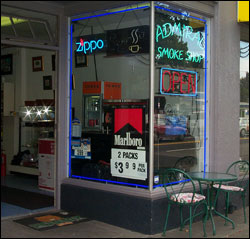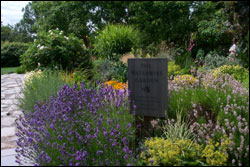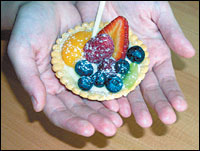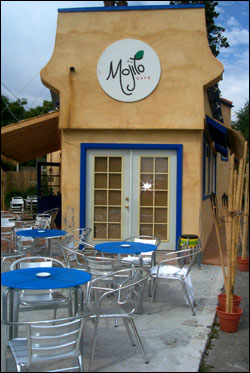On May 23, 2003, Tuere Sala, a prosecutor with the city of Seattle, says she set a precedent for how the drug war will be waged here. That was the day Todd Marsh, the owner of the Admiral Smoke Shop in West Seattle, was convicted of distributing drug paraphernalia, the first time, Sala says, the owner of a business representing itself as a tobacco store has been found guilty. On its own, the successful prosecution of Marsh (which is now on appeal), wouldn’t raise many eyebrowsparaphernalia convictions are fairly rare in Seattlebut the steps the Seattle police took to secure Marsh’s conviction demonstrate a new aggressiveness on the part of local law enforcement to go after retail storesnot just head shopsthat sell merchandise favored by drug users.
The story of Marsh’s arrest began in fall 2001 with the formation of the Drug Paraphernalia Project by the Seattle Police Department. The project targeted mini-marts that were selling glass tubes containing small fake roses, and pens with glass tubes. The items, which commonly retail for just a few dollars, can be used to smoke crack. In response to concerns expressed by members of the community in West Seattle about these improvised crack pipes being found on the street, the South Precinct’s Community Police Team distributed letters to 19 West Seattle mini-marts and gas stations officially informing them that the roses and pens they were selling were in fact crack pipes, and that if the businesses continued to sell them, they would be in violation of state law. “The idea was to give all these people the opportunity to get rid of these products without prosecution,” says Sala, who is the city attorney’s office liaison for the South Precinct.
According to one of the Community Police Teams’ operation orders, the target of the project was “mostly concerned with the sales of straight glass tubes, with or without the rose, to include pens and pipes.” But on Jan. 4, 2002, Officer Willie Askew of the Community Police Team received a phone tip about bongs, pipes, and assorted other paraphernalia for sale at the Admiral Smoke Shop. The shop had not been an original target of the Drug Paraphernalia Project.
Members of the Community Police Team first visited the Admiral Smoke Shop that afternoon to follow up on the tip. Askew and Officer Carl Chilo, as reported in court documents, entered the store and witnessed numerous metal, wooden, acrylic, glass, stone, and ceramic pipes, as well as water pipes, chillums, and scales. The items in the store, Askew wrote in an affidavit for a search warrant, ranged from $6 to $250, well above the sums charged for rose pipes and glass pens at the mini-marts.
Marsh told police at the time of the visit that the sales of such items weren’t illegal, as he sold them for tobacco use only to adults at least 18 years old. Photographs taken by police on subsequent visits and during Marsh’s later arrest show numerous signs stating that items sold at the smoke shop were for tobacco use only, and that water pipes must be referred to as such or customers would be asked to leave. Such disclaimers are a common tactic used by stores to avoid trouble with the law.
Marsh’s attorney, Douglas Hiatt, says that the Admiral Smoke Shop wasn’t selling rose pipes or glass pens. Sala agrees, but says that the water pipes and glass pipes Marsh was selling, while commonly used to smoke marijuana, could also have just as easily been used to smoke crack.
Police came back to the Admiral Smoke Shop on Jan. 7 to deliver a copy of the relevant laws to Marsh, and returned on March 15 to deliver a copy of the letter that they had distributed to mini-mart owners, informing Marsh that the Community Police Team considered what Marsh was selling to be paraphernalia.
THE WASHINGTON STATE Constitution requires that in order for someone to be prosecuted for the distribution of drug paraphernalia, they must know that what they are selling will be used for illicit purposes. Sala says that was the purpose of delivering letters to the mini-marts: to put them on notice about how the rose pipes and pens were being used. When police brought Marsh his letter, he refused to sign it, saying he needed to consult his attorney. Police then initiated a series of undercover operations designed to catch Marsh selling pipes knowing that they were for drug use.
The first operation was on May 2 when Askew returned to the Admiral Smoke Shop with Officer Susanna Monroe, who was working undercover. Monroe purchased a blue and yellow swirled glass pipe that day for $40 and returned on May 15. When she came back, she carried with her a bag of marijuana, which Askew had borrowed from the Seattle police evidence room, wrapped in a $10 bill. She asked to buy a $7 metal pipe, and when it came time to pay for it, Monroe unwrapped the marijuana and dropped it on the counter. Monroe said in a statement she wrote after the buy that Marsh recognized that the bag contained marijuana, providing Sala with the evidence she needed to prove that Marsh knew what he was selling would be used illegally. But Hiatt contends the dropping of the marijuana was entrapment. “This was a last-ditch effort to get enough to try Marsh. It was a setup, just a straight-up setup,” he says. A search warrant was subsequently served upon the Admiral Smoke Shop, and 271 pipes and bongs, which now fit squarely into the legal definition of drug paraphernalia thanks to the evidence provided by Officer Monroe, were taken. Marsh was arrested, and charged on June 26, 2002.
After hundreds of hours of police investigation, over a year of court proceedings, and untold thousands of public dollars, Todd Marsh was found guilty by a jury on three counts of distributing drug paraphernalia. Drug paraphernalia distribution is a misdemeanor punishable by a maximum of 90 days in the King County Jail and a fine of $1,000, but Marsh was only sentenced to three days of electronic home monitoring and a $250 fine. “This was a criminal act. Despite the sentence imposed, it will send a message to other stores out there,” says Sala. If the city wins Marsh’s appeal, Sala will have the legal precedent she and other prosecutors need to go after other businesses selling pipes and bongs. But Hiatt feels it is a very dangerous precedent. “If the city is able to prevail on appeal, it gives them a green light to do more of these worthless prosecutions.”








